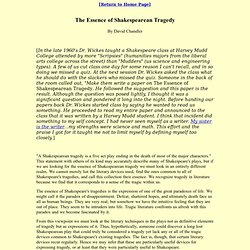

The Tragic Downfall of Shakespeare's Macbeth. The Tragic Downfall of Macbeth Macbeth, at the beginning of the play, seems to be a very loyal and honorable person.

However, his character is changed by the influences of several factors. These factors have an influence on Macbeth, but he is responsible for his own destiny. The influences of the witches' prophecies, the influence of Lady Macbeth, and Macbeth's ambitions, are they key factors that lead to his tragic downfall. The witches (or "weird sisters" as they are often called) are responsible for putting the idea that Macbeth would become king of Scotland in his head, but in the end, it's Macbeth's decision to fall for and make this idea happen.
Lady Macbeth is shown early as an ambitious woman who can manipulate Macbeth easily. When she hears of his change of plans. At this point in the play, Macbeth's ambition starts to come into view. Macbeth Navigator: Macbeth: His Fear of Fear. Macbeth: Analysis of Major Characters. Macbeth Because we first hear of Macbeth in the wounded captain’s account of his battlefield valor, our initial impression is of a brave and capable warrior.

This perspective is complicated, however, once we see Macbeth interact with the three witches. We realize that his physical courage is joined by a consuming ambition and a tendency to self-doubt—the prediction that he will be king brings him joy, but it also creates inner turmoil. These three attributes—bravery, ambition, and self-doubt—struggle for mastery of Macbeth throughout the play. Shakespeare uses Macbeth to show the terrible effects that ambition and guilt can have on a man who lacks strength of character. Before he kills Duncan, Macbeth is plagued by worry and almost aborts the crime. Lady Macbeth Lady Macbeth is one of Shakespeare’s most famous and frightening female characters. Collections Online : The Cambridge Companion to Shakespearean Tragedy. The Essence of Shakespearean Tragedy. [In the late 1960's Dr.

Wickes taught a Shakespeare class at Harvey Mudd College attended by more "Scripsies" (humanities majors from the liberal arts college across the street) than "Mudders" (us science and engineering types). A few of us cut class one day for some reason I can't recall, and in so doing we missed a quiz. At the next session Dr. Wickes asked the class what he should do with the slackers who missed the quiz. Someone in the back of the room called out, "Make them write a paper on The Essence of Shakespearean Tragedy. "A Shakespearean tragedy is a five act play ending in the death of most of the major characters. " The essence of Shakespeare's tragedies is the expression of one of the great paradoxes of life. From this viewpoint we must look at the literary techniques in the plays not as definitive elements of tragedy but as expressions of it.
Let us consider several characteristics common to Shakespeare's four great tragedies. Macbeth - Manhood Essay. Macbeth Theme of Gender. Macbeth: Themes, Motifs & Symbols. Themes Themes are the fundamental and often universal ideas explored in a literary work.

The Corrupting Power of Unchecked Ambition The main theme of Macbeth—the destruction wrought when ambition goes unchecked by moral constraints—finds its most powerful expression in the play’s two main characters. Macbeth is a courageous Scottish general who is not naturally inclined to commit evil deeds, yet he deeply desires power and advancement. He kills Duncan against his better judgment and afterward stews in guilt and paranoia. The Relationship Between Cruelty and Masculinity Characters in Macbeth frequently dwell on issues of gender. At the same time, however, the audience cannot help noticing that women are also sources of violence and evil. Ultimately, the play does put forth a revised and less destructive definition of manhood. The Difference Between Kingship and Tyranny In the play, Duncan is always referred to as a “king,” while Macbeth soon becomes known as the “tyrant.”
Motifs Violence Blood.